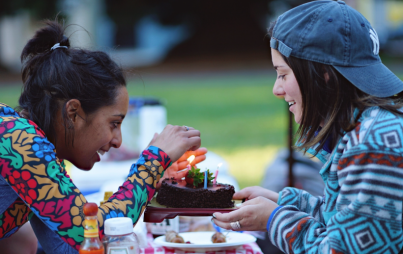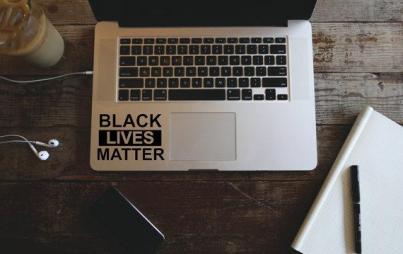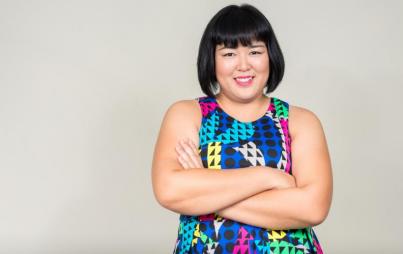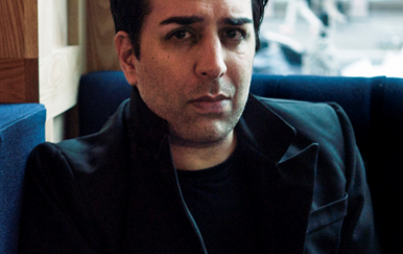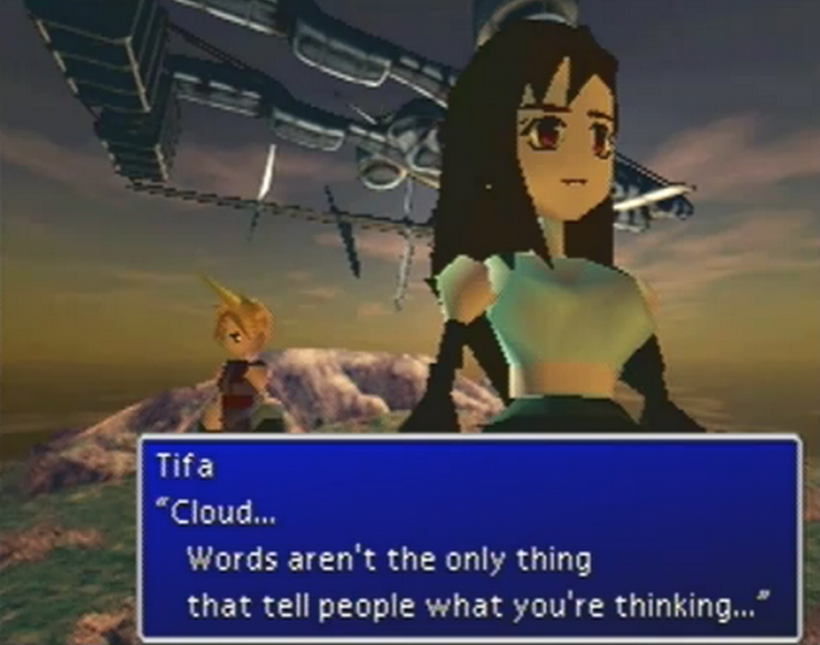
Credit: Final Fantasy VII
I hated who my body was making me become in real life. So I decided that I would channel Tifa whenever the teasing and bullying got to be too much, whenever the weight of my own helplessness at controlling what was happening got to be just too much to bear.
Turning ten was a big deal for me. I got to say I was in the “double digits.” I was on my way to becoming a teenager (only three years left!). I had my first Tamagotchi to take care of and had a secret code of hand signals with my good friends, so we could make plans for recess without the teacher—or The Boys—catching on.
Ten was also the time I started getting teased and bullied; against my will and desire, my body decided it was now time to start doing things I wasn’t mentally or emotionally prepared for. I started my period. I hit puberty. I gained a lot of weight. I nearly doubled in size over the course of one summer—and it wasn’t going uncommented on.
I was this little girl who just wanted to pretend to be Posh Spice with the other girls on my baseball team, suddenly transformed into this new person with a new body I didn’t know how to control, one that seemed to have a mind of its own. It bled of its own account. It sweated of its own account. I grew dark hair on almost every part of my visible body. And no amount of shaving would reduce the dark splotches of skin under my armpits.
All of a sudden, I felt like an entirely different person.
And people treated me differently. Things that had never been an issue before were at the forefront of everyone’s mind. “Why is there blood on Kaitlin’s shorts?” “Oh my god, do you see all that sweat under her arm pits?” “Does she even fit in her desk anymore?”
As if I hadn’t felt it already, others made sure I knew it: I had changed.
You’d most notably see this change in my diary. It was a typical young kid’s diary. The front was bright yellow smiley faces, the inside covers plastered with pictures of my friends and my dog. It started off as a happy diary belonging to a happy and content kid.
But after I turned ten, I stopped filling it with personal details. I no longer talked about my crushes. In fact, I stopped having crushes on kids in my class altogether because, as a girlfriend of mine had said, “I’m sure the boys only like you because you have boobs.” I was ten, and already made aware of the fact that my body took precedence now over anything else that I was.
I retreated, to a smaller group of friends, to writing fan fiction, to playing video games. These worlds were safe. I could be anybody in these worlds. When I played first person shooters like Unreal, my body didn’t matter. Bodies were so inconsequential they didn’t even need to be on the screen. My diary entries became dedicated almost solely to the video game narratives I was playing.
When Amomen tried to romance my woman character in Baldur’s Gate, I told my diary how awful he was and how when he professed his love for me, I rolled my eyes, because he was way too snotty and pretentious for me. But I romanced him all the same. I mean, he had yet to make a comment about my boobs or my weight, so what more could I ask for in a digital, fictional lover?
When I started playing Final Fantasy VII, my diary effectively became a devoted, unofficial walkthrough of the game, as the game and its events took over my entire life. With Baldur’s Gate, I would sometimes play with a friend, she and I taking turns to make decisions and fight battles. But with FF VII, it was mine and mine alone. I couldn’t take anybody else with me into this world.
It was escapism, pure and simple—and it meant the world to me. Getting to breed chocobos was far better than sitting in the back of the class with my arms folded over my stomach so nobody could see all the weight that was accumulating there.
And in Final Fantasy VII, I could pretend I was Tifa Lockhart, the tough activist who punched and kicked her way through any enemies.
Tifa was everything I wanted to be. She was smart, she was fierce, she was compassionate, and she was reliable. She wasn’t the Pretty One (Aeris deservedly took that place). Tifa was the best friend and supporter.
She owned a bar and worked for the eco-activist group Avalanche as a way to get revenge on the people responsible for the destruction of her hometown. Tifa knew what she wanted, and she did what she had to do to get it.
But she was also fragile. She was hurt by Cloud’s cold-heartedness when he made it clear he loved Aeris. Tifa’s compassion left her vulnerable. She took her weaknesses and made it into one of her greatest strengths: her compassion for her friend and the world around her.
I hated who my body was making me become in real life. So I decided that I would channel Tifa whenever the teasing and bullying got to be too much, whenever the weight of my own helplessness at controlling what was happening got to be just too much to bear.
Since then, I’ve made good on my promise to my childhood self—at least, as much as I’ve been able to; I’ve been the activist, fighting for environmental rights.
From working on an environmentally focused video game that got my company in some hot water with the Canadian government, to leading charity organizations in raising money and awareness, to working at an educational publisher that prides itself on producing diverse and socially-conscious textbooks for children, I’ve formed my own internal Avalanche, made up of various coworkers, colleagues, and friends.
And I’ve been the girl. The girl that was always there, waiting in the rafters while I saved the life of the person I loved, even when he was hoping, praying, imagining, it was another woman he loved grabbing his hand and pulling him up, preventing him from falling into a void he could never recover from.
I’ve worn white crop tops and faux combat boots, letting my dark brown hair hang long and proud. I’ve been a fighter, both physically and metaphorically. I’ve tried my hardest to champion and defend causes I care about. In whatever way I could, I’ve been Tifa, member of Avalanche, in my own daily life.
What endears me to Tifa is that even if you remove Cloud from the equation, she still has a solid backstory, personality, and motivation. She does not just exist for him. She exists for what she believes in, and while Cloud is a part of that, he is not the full story for her.
I was unapologetic in being who I was and who I wanted to be. I am what I saw and respected in Tifa. But what now? What happens after the battles have been fought, the lives have been saved? The battle isn’t over. The battle will never be over. And I’m already exhausted. I’ve already fainted.
I’m writing this in the midst of one of the best—and one of the worst—years ever. I’ve put my whole being into my work. I’ve written about mental illness, about intersectional feminism, about religion. I’ve made my games about my eating disorder, my severe depression. I’ve been told they’ve helped people. I believe them. I believe in them.
At the same time, I have never experienced or seen such hatred, disgust, and anger for the work that I, and many others, do in such unrelenting extremes. And now I am even more broken.
Some people will hear you and support you. And others will tear you down. That’s life. That’s how it is. I can quit games journalism, I can stop making games. I can go away.
The vicious hatred that comes from angry gamers, well-intentioned yet woefully problematic activists, MRAs, and conservatives trying to legislate in violations of human rights, isn’t actually related to games or art or whatever—it comes back to us, to our bodies, to our identities, to my being a woman and others being who they—people of color, trans, non-binary, queer, of varying abilities, mental and physical—are proudly, and ultimately, it comes down to even just existing, or wanting to exist, in this space now.
I love Tifa Lockhart for who she inspired me to become. Ask others what they remember of her. Most will say: “Oh, the one with the big boobs, right?” or “The one who didn’t wear the pink dress?” She rarely makes lists about the best women characters in video games now (unless you count Top Five Sexiest Female Video Game Characters).
Always, always, reduced to our bodies.
So, what are we left with now? How do we keep finding the strength to keep fighting?
The only answer I’ve been able to come up with so far is: each other. In every small act of resistance, and no matter how much it may seem so at the time, we are not alone in our struggles to exist beyond our bodies.
That may sound trite, and may even be. But, hey, it’s something.




